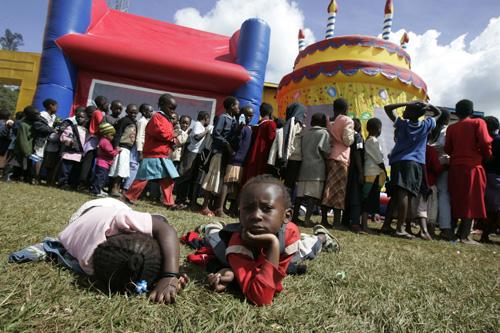Death toll rises in Kenya despite calls for ‘peaceful rallies’

January 21, 2008
NAIROBI, Kenya – Kenya’s opposition party, determined to bring down President Mwai Kibaki’s government, called Saturday for another day of “peaceful rallies” despite the deaths of more than 20 people in this week’s demonstrations.
Police took forceful action at rallies Wednesday through Friday protesting the Dec. 27 presidential election, but opposition party chairman Henry Kosgey told reporters “we will use each and every means to bring down Kibaki’s government.”
Kosgey called for more rallies on Thursday, in defiance of a government ban and to the disapproval of the European Union.
“Mass meetings … can lead to violence,” EU Development Commissioner Louis Michel said, after holding what he called “positive” meetings with both Kibaki and opposition leader Raila Odinga.
He said both sides “appeal to end the violence,” and agreed to recognize mediation efforts by former U.N. Secretary-General Kofi Annan.
Get The Daily Illini in your inbox!
Five more people died in ethnic clashes Saturday. Kalenjin, Kisii and Kikuyu fought each other with bows and arrows and machetes around a Catholic monastery northwest of Nairobi. Police said they were guarding the monastery, where hundreds of people have sought refuge.
Nearly 200 houses were set ablaze in what appeared to be an old argument about land.
In a separate incident in Nairobi’s Mathare slum, several homes were set ablaze during several hours of running battles between Kikuyu and Luo ethnic groups, resident Boniface Shikami said Sunday morning. Kibaki belongs to the Kikuyu, Kenya’s largest ethnic group, and Odinga to the Luo.
One man was beaten to death – a Luo who was riding his bicycle through a group of Kikuyus – as the battles continued for several hours through the night, said resident David Oromo.
More than 600 people have been killed in Kenya’s election violence, according to a government commission.
U.S. Ambassador Michael Ranneberger, citing “many factors and underlying grievances,” has compared Kenya’s violence to the 1968 race riots in the United States.
At a town hall meeting Friday for Americans in Nairobi, Ranneberger said there had been “a lot of cheating on both sides” in the Dec. 27 elections that pitted Kibaki against Odinga.
The U.S. maintains there were allegations of improprieties on both sides that were not properly investigated, and Ranneberger said either Odinga or Kibaki could have won by 120,000 votes because it was a close election and both sides are alleged to have rigged.
But David Throup, an associate of the Washington D.C.-based Center for Strategic and International Studies, said in a public conference call with Ranneberger that Odinga won by 120,000 votes.
Kibaki’s power becomes more entrenched each day. The opposition’s best hope may rest in a power-sharing agreement that might make Odinga prime minister or vice president.
Michel, the EU development commissioner, also met Saturday with Deputy President Kalonzo Musyoka, and urged him to come to an agreement with the opposition.
Associated Press writers Tom Maliti, Malkhadir M. Muhumed, Tom Odula and Michelle Faul contributed to this report.






